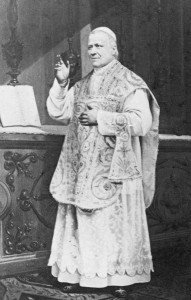When the Founding Fathers wrote the Constitution of the United States, they made liberal use of the concept of rights. They famously held that such rights were “self-evident,” and were an endowment from the “Creator.” This assertion made perfect sense in 1776 when Western civilization had been Christian for a thousand or more years. But historically speaking, there is a problem here. If human equality and the existence of a Creator are really self-evident truths, then what are we to make of societies that recognize neither? The confident assertion of self-evidence is connected to the general immodesty of the Enlightenment, at once ambivalent about its debt to Christianity and naive in questions of epistemology.
The concept of a rights was a relatively recent creation in 1776. It grows out of Canon Law, oddly enough. But the notion of rights gets its modern shape from the trials of the Reformation. The Catholic Church was somewhat reluctant in the eighteenth and nineteenth century to go along with the newer, sweeping ideas about rights, not because she did not think that human beings had them, but for subtler reasons. First of all, rights are typically against some coercive power. But what if the coercive power happens to be on the side of truth and the person or group asserting the right not to be coerced is causing harm? Hence the old saying, “Error has no rights.” The larger problem, however, is the individualistic idea of society that emerges from relying too much on rights. In the modern world, rights language is at home in ‘social contract’ theories of society. In these, the individual is normally held to exist prior to the community. Individuals thus enter communal arrangements freely by contract. This is not Catholic doctrine. For Catholics, the family and the community exist prior to the emergence of new individuals from their mothers’ wombs, and these new individuals are to be welcomed into already-existing social structures, structures from which these individuals will receive their identity. Without a clear and solid grounding in this social reality, rights will tend to break apart society, turning individuals defensively, or even at times aggressively, against each other.

Pius IX: He never actually said “Error has no rights,” but the saying is grounded in his Syllabus of Errors.
He also graces the south transept of our church.
My point in writing this is not to lament the Supreme Court majority ruling in Obergefell v. Hodges. Rather, I’ve been thinking through how to respond as a respectful dissenter to this decision. The tendency of many conservative-leaning commentators has been to focus on a robust preservation of the First Amendment, which provides for the right of the free exercise of religion. It is not for me to assess the prudence of pursuing this as a short-term strategy. However, in the long term, I don’t believe that we can expect the language of rights to offer much protection, oddly enough, for what Catholics would recognize as the free exercise of their religious faith. This is because the Catholic faith is inseparable from the common public good, and therefore something to be exercised publicly. I suspect that an emphasis on religious rights will ultimately undermine the position of traditional Christians. Oddly enough, one of the most cogent voices explaining why this is so is Karl Marx.
Marx thought that the language of rights was something of a farce. Why? For rights to have any practical effect, they require certain historical social institutions. In Marx’s time, these institutions were historically theistic, indeed Christian. Marx didn’t care for the reliance on theology, but not simply because he himself was an atheist. Rather, he saw that appeal to a Creator gave the wrong impression that rights could have any kind of practical worth absent the sorts of institutions that just happened to exist (or not exist) in nineteenth-century Europe. Rights require actual human beings to enact them, and they need therefore certain kinds of human beings with certain kinds of moral sensibilities. When the historical circumstances that produce this kind of human being change, rights disappear, or at least lose their teeth. And what then? Marx would further ask us, “What sort of human beings actually do articulate rights?” Not disinterested philosophers, but highly invested, socially powerful persons–at least typically. And so for Marx, the language of rights made certain truth claims that actually disguised the interests of those who used the language, and obscured the exploitation of the disenfranchised.
Since that time, Catholic social teaching has unambiguously asserted the reality of rights, but always in the broader context of God’s purposes for humankind, the fundamental solidarity of humanity, and the duties discerned via revelation and natural law. This perspective is thus available to those who accept God’s revelation. What happens when the language of rights is uprooted from the Christian worldview in which it sprouted? I can’t pretend to prescience on this point, but I would suggest that Marx is basically correct: rights will become a tool for political parties to advance their interests at the expense of the politically weak. And if those politically weak parties continue to understand rights as gifts from God, they will almost certainly find little success in defending such rights against those whose understandings of God differ from them, if God even exists.